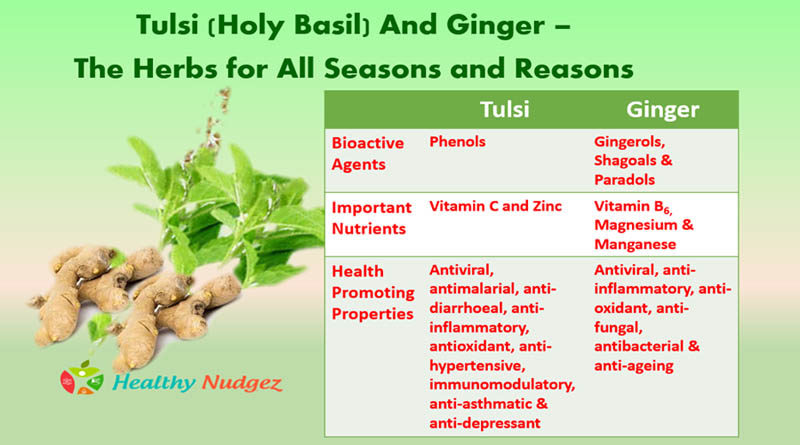Tulsi (Holy Basil) And Ginger – The Herbs for All Seasons and Reasons
A holistic approach to health and disease, means preserving and promoting good health and preventing diseases. This is possible if one follows healthy lifestyle practices, such as consuming fresh, minimally processed foods, daily physical activity as per requirement and managing stress. Certain foods and herbs have been proven to possess properties which help to detoxify the body, boost immunity and protect against many diseases.
Tulsi or Holy Basil is a plant belonging to the mint family and is well known for its aromatic leaves. Tulsi leaves have been used for centuries effectively in India, as a remedy for viral flu, cough and congestion. The bitter leaves of Tulsi , have magical medicinal properties and are the best natural antibiotics. It is a strong disinfectant and also has strong germicidal properties, that is the reason why it is considered as a great immunity boosting herb.
Some studies have proven that Tulsi protects the body from many chemical pollutants, it is also helpful in normalizing blood sugar, blood pressure and blood lipid levels. Many studies have shown that Tulsi possesses, antibacterial, antiviral, antifungal, antimalarial, anti-diarrhoeal, anti-inflammatory, antioxidant, anti-hypertensive, antipyretic (effective against fever), anti-analgesic, immunomodulatory, anti-asthmatic and anti-depressant properties.
Tulsi protects the body from the damaging effects of various toxins and also from free radical damage. This is due to a high phenolic content of Tulsi, which act as scavengers of free radicals from the body.
The phenolic compounds, along with vitamin C and Zinc that are present in Tulsi are all responsible for its antiviral, antibacterial, antifungal and anti-inflammatory properties. These also improve the production of white blood cells in the body which are the cells that fight with the various disease-causing germs, that invade our bodies.
Apart from all this, Tulsi has been shown to reduce tooth decay and promote oral health, including the gums and the oral cavity. This is the reason why; it is used in many herbal mouth washes.
Tulsi also has anti-ulcer and ulcer-healing-properties as it reduces acid secretion and enhances the secretion of mucin from the mucus cells, which protect the inner layers of the stomach.
Tulsi leaves can be chewed fresh or added to tea, soups and broths. The juice of Tulsi leaves can also be take raw on empty stomach with lukewarm water, which will help reduce weight, blood glucose levels, blood pressure and blood lipid levels. This also helps in detoxification and blood purification. Tulsi juice when taken with honey helps to soothe the throat, provides the relief from cough and also reduces chest inflammation. It also helps to cure many respiratory diseases. Tulsi can be mixed with other immunity boosting herbs, such as ginger, black pepper, turmeric, cinnamon and cloves to be made into a “kadha”, for added beneficial effects. This kadha when taken with lemon juice and honey, 2-3 times in a day, helps to boost immunity. It is also an effective remedy against sore throat, cough, cold, fever and headache, which is why it is used commonly in many Indian households.
Ginger: Ginger is a root and is used as a spice and condiment, in many countries’ world over, to add flavour and taste of food. The health promoting properties of ginger are due to the presence of many phytochemicals or biologically active substances (those chemicals which become active in the biological system). These are gingerols, shogaols and paradols. These impart ginger with its antioxidant, anti-inflammatory, anti – bacterial, anti-viral and antifungal, anticancer, antihypertensive, antidiabetic, and anti-ageing properties. Its anti-microbial properties are helpful in preventing infectious diseases. Also, these phytochemicals help in boosting the immune system. Studies have shown that fresh ginger is effective against the viruses that cause the respiratory infections, reduce inflammation and help to keep the immune system healthy.
Other nutrients found in ginger are vitamin B6, minerals like magnesium, and manganese, about 30 different types of amino acids, some amounts of carbohydrates, enzymes and coenzymes. Due to the presence of enzymes and co-enzymes ginger is helpful in improving digestion and reducing nausea. It helps in reducing muscle pains and also helpful in treating arthritic pain. In smaller quantities ginger may be helpful in nausea and vomiting in motion sickness, cough, flu, chronic pulmonary disease, improves milk production in lactating mothers, reduces joint pains, helps improve appetite in people suffering from eating disorders (should not exceed more than 1.2 gm/day before meals), also helpful in weight loss, reducing blood cholesterol (1 gm thrice daily for 45 days) and sugars, and causes diuresis.
Ginger can be taken as fresh ginger or in the dry powder form. Although studies have shown that fresh ginger provides most of the health benefits. Moderate consumption of ginger is normally advised, that is around 4-5 gm in a day.
Best way is to incorporate in tea, warm cup of ginger tea is not only tasty but also effective in relieving sore throat, cough and pain. It is also helpful in relieving stomach pain and nausea. Even helpful in alleviating morning sickness in pregnant women. Ginger is normally added to curries, soups, gravies and other food preparations. Ginger juice mixed with honey and black pepper helps to relieve sore throat. Ginger juice in water with honey and water helps in improving hydration and have anti-bacterial properties. Grated ginger can also be added to salads for added benefits. Ginger juice can also be added to orange and other fruits juices for taste and health benefits.
However, too much ginger can be harmful and cause acidity and heartburn. It should be avoided by people who are on blood thinners or who have kidney problems.
For online Diet Counseling and Yoga Classes please visit the package section. Also atch our youtube channel for videos on health, yoga and lifestyle related topics.

